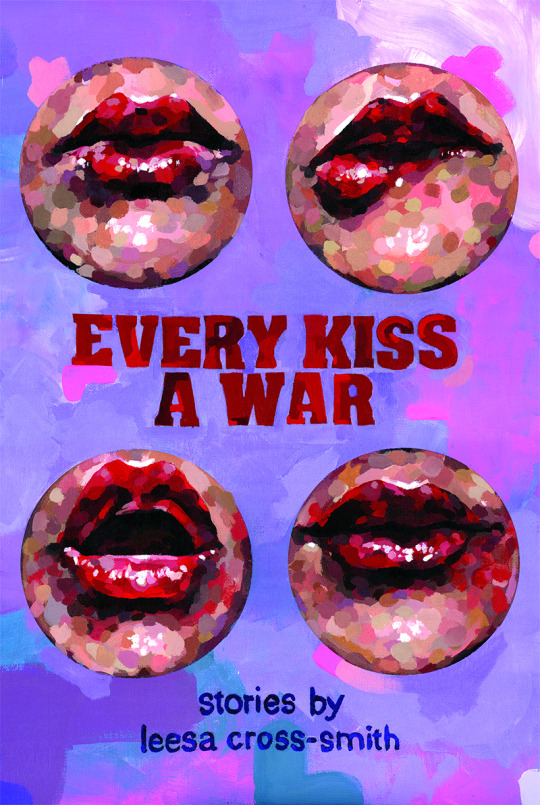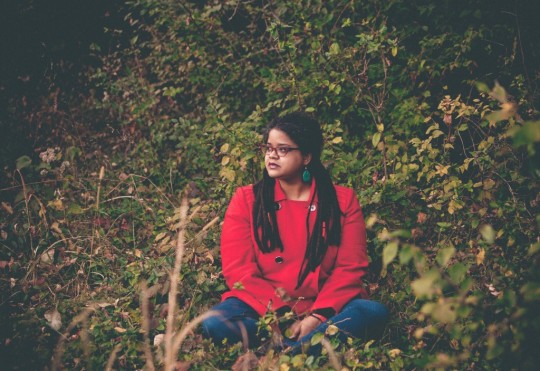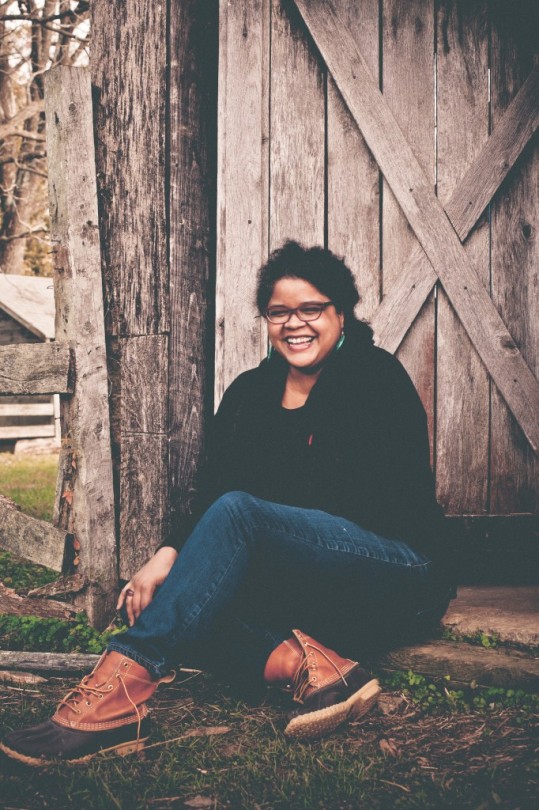#leesa cross smith

Fellow Female Gazer Leesa Cross-Smith’s award-winning debut Every Kiss a War is one of the sexiest books of all time–a collection of twenty-seven heart-throbbing, richly detailed stories concerning a series of evolving relationships and their inhabitants. These are highly textured, strong-voiced men and women who kiss and run and fuck and fight and mourn and pine and find themselves standing in a light snow with someone they don’t love and drinking “ice clinky frontier whiskey” and wearing bracelets that make bright sounds and letting someone kiss them “because fireworks.” When I think of these stories, I see starlit gravel roads; a girl standing in the southern heat, pretty brown legs ending in cowboy boots; a dimly lit kitchen swollen with country music; a woman’s braid coming undone in the crepuscular light; and ROSCOE PIE, written twice and underlined.
1. One of the things I love most about your work is how sensually vivid it is. There are so many stellar passages I can’t possibly start referencing them–I’d end up pulling at least twenty quotes. Do you write lines like this in bits and pieces, as inspiration strikes, stitching together so many colorful word-quilt patches, or do you sit down and write in long bursts until you get to the end?
Thank you so much for this sweetness Dawn! I appreciate it and you muchly. I write most of that kinda stuff in bits and pieces, yes. I will sometimes write a whole list of them in the notes on my phone and put them together later…however they end up coming together.
2. How important is symbolism to you?
I rarely do it on purpose. Sometimes it happens and I’m not even fully aware of it and that’s my favorite!
3. Your collection is a blend of flash fiction and longer stories–you seem to flit back and forth effortlessly. Which comes more naturally: little fables or tall tales?
They both seem to come naturally, honestly. I like to go back and forth because some stories just feel longer than others and some…I only want them to be a little peek between fingers. A blink of a feeling.

4. So let’s dish about genre a little bit. In my humble opinion, you definitely write love stories but you’re not technically a romance writer. If I were a librarian I would shelve your book in the general adult/literary fiction section. Do you find any value in these kinds of distinctions? Speaking of which, I’ve always carried a hot stone of hate for the “African-American” section in libraries/bookstores for several reasons–chiefly because an author’s race tells readers absolutely nothing about their book(s) and because it’s often ghettoizing. Is that a “pet peeve” of yours too?
Romance is my favorite thing to write…complicated relationships. It’s what I always come back to. And I always wanna be able to keep those ideas fresh and sexy and comfy and compelling and not-cliche. I think the distinctions can be super-helpful for people when they’re looking for a certain feel or emotion as they’re hunting for a book…but a good book is a good book and a good story is a good story, no matter what the label is.
I’m prettymuch anti-African-American section for the same reason you are. Once we start doing that…we have to do that for everyone/everything right? I’m African-American with some Great British and Scandinavian. I also love noodles and strawberries and Harry Styles. I could be shelved in a lot of different ways and so could everyone! It’s weird to me. I mean I get it…in a way…but it’s still weird.
5. Some of your stories have a male protagonist (Hem, The Wild Hunt, Wayfaring). I believe you write men quite well, whether they’re protagonists or love interests or supporting characters. Do you find it difficult to step inside a man’s mind and write from his perspective?
Thank youuuu! I love writing men/writing about men. I love the quote from Sylvia Plath’s journals where she writes “My consuming interest in men and their lives is often misconstrued as a desire to seduce them, or as an invitation to intimacy.” Men interest me because humans interest me. It’s not always about sex or seduction or lust. I just like trying different things and coming from different points of view.
When writing from a man’s point of view I tend to make them a little more straightforward and a little less chatty. This is because most of the men in my life are that way. But when it all boils down I always give them the same emotions I give my women. Because people are people. And I write both the men and women in my stories as having lusty, sinful, grumpy…whatever thoughts because some feelings are universal.
6. I LOVE your Every Kiss A War playlist. Totally perfect mood music. Did you listen to these songs while you were writing or did you arrange the playlist later?
Thanks for listening! I don’t really listen to music when I write, but I had some songs in mind that I wanted to put on the playlist. The Steve Nicks, the Neko Case…those were on the list in my head from the very beginning.

I’m deeply in love with your trilogy of stories (What the Fireworks Are For; Hold On, Hold On; Cheap Beer & Sparkles) starring Violet, a strong-willed but painfully confused runner with a husband, Dominic, and a crush, Roscoe Pie (I also have a crush on the perfectly-named Roscoe Pie, thanks to you!). I have a major soft spot for recurring characters, as you know, so I have a couple questions:
7. What first inspired you to write this trilogy?
!! Thank you Dawn! I do have a crush on Roscoe Pie, too. I love him madly. I wrote the first one “What The Fireworks Are For” just because I wanted to write about a wild girl. A woman who was gonna do whatever she wanted whenever she wanted. And when I got to the end of that story I realized that I wasn’t finished yet. I couldn’t stop thinking about her. I’d recently finished Fear of Flying by Erica Jong and I wanted to write about a woman who ran away from her husband for no real reason besides the fact that she just wanted to…a woman who was confident and surprising and rebellious and confused and a lot of other things too.
8. Did you know Violet’s saga would be more than one story from the start?
I didn’t! I was just gonna go with it and it turned into three stories then it turned into a full novel, which was nice and surprising.
9. Do you see more story series in your future?
There is another recurring character in my collection. His name is Sam. I have other stories about him and could probably write a whole novel about him too. I really love Sam. I think about him a lot and he’s special to me. He’s a precious man.
10. Speaking of which, I was tickled pink to read that you’re working on a novel starring Violet. Can you tell us anything about it?
Aw, yay! I have it all finished and it’s in my agent’s hands now, which is still so surreal and amazing for me and always will be. It’s a continuation of the trilogy of stories from my collection and it’s about Violet and Roscoe and Violet’s ex-husband Dominic and all that those complicated relationships entail. I could write a couple more books about Violet. I adore her, even the hard to love parts. She’s so sexy and complicated and messy and wild and easy and hard to love. She feels real to me so I just keep writing her because bless her heart…I wanna kiss her mouth.
Conversation by Dawn WestandLeesa Cross-Smith.

Vanessa Jimenez Gabb writes some chill, laid-back poetry. Even the title of her poetry chapbook, Weekend Poems (Dancing Girl Press), implies taking it easy. These are poems for the weekend, not an awful Monday morning in a meeting, not a Wednesday afternoon stuck in traffic, not a Thursday night run to the grocery store. Weekending. These are poems to be read shoes-off on a couch; these are poems to be snacked on like chips. These poems are Doritos.
Gabb’s poetry is life seen through the dirty windshield of a taxi. Life seen through the fanned smoke of a party you probably shouldn’t be at anyway. Gabb’s writing is at times gritty and dirt-in-your-teeth, at times strikingly pretty, at times both.
In the first poem “At the Apt.,” she begins, “here is the soundless party/here everything inside is happening/we are bad/we are feeding/cats lick sugar from our fingers.” And later, “we eat cakes in our underwear/our faces powdered and glazed/like dumbasses/like monarchs.” The language is frank and plain while remaining all up in your grill. While I was reading this, I kept thinking THESE POEMS WOULD TOTALLY START A FIGHT WITH YOU. These here are fightin’ poems.
Like in the poem “While Reading” when she writes “You walk in these gardens I know/And people call ugly ho/They bang the shit from you/Till there’s glimmer” and in “After the Party” when she begins “There are certain things to not lose sleep over:/Drinking too much/Police officers/The windows unopened/Hearing women use the toilet/And call for anything/For the rest of their nights/Your man leaving you guns/Holding him down/Like a neighborhood bar/Blowing trees through tampons.”

And then there’s the beauty of the opening lines of “In West New York, NJ” when she writes “the homegirls are brunch drunk/are tigers in the freezing/the water all the lights/in the water the sky/a skyline in their pockets” and later in that same poem, we see that beauty smashed up against the toughness when she writes “can we not do something else/with our lives besides this?/like kill birds/there’s something in the black cold/makes them want to slap someone.” And again in the poem called “At the Sushi Spot” when she writes “Soft and sweet and clean. You care about being just this way. Doing all the brutal pretty things to yourself to not smell of dirty waters.”

I loved the opening lines of the poem titled “At the Bar” when she writes “There is a wedding/If you look past the football on television/You can see the white/Of the bride’s dress/A mermaid dress/A snow queen/And the black water of her hair.” And in “On Text” Gabb writes “I lipsticked lines of this msg/On the bathroom mirror/Maybe that wasn’t smart or indecent enough/But we needed a thing like it/U haven’t said it was beautiful/But it’s been there a week/Have u seen it/U must see it/Every time u see yourself.”
TheseWeekend Poems are totally for chillaxing. Easy reads and fun. They’re delightful paradoxes, both as pretty and dirty as New York City—a glittering skyline of words reflected in a neon-green sludge puddle.
Review by Leesa Cross-Smith.

When I was a teenager, my journal was everything. Sometimes I’d tape ticket stubs in there or write about the movies I stayed up too late to watch. I made mixtape lists in there and a list of boys I wanted to kiss and boys I already had—rated them on a scale of one to ten. I wrote down hilarious (to me) things people said. Like the time my then-boyfriend, now-husband, Loran, just randomly said “If I was a dog I wouldn’t bark.” I covered my journal in Tori Amos, Ani DiFranco, Alanis Morissette, Sarah McLachlan and Liz Phair song lyrics, filled it with my celebrity crushes (Leonardo DiCaprio, Jeff Buckley, Dave Matthews) and my thoughts on religion and the world and Drew Barrymore-ish outfit ideas.

I unabashedly love my teenage heart forever and am always seeking out things to recreate those feelings. For me that means rambly girly thoughts about boys and emotions all mixed up with declarations about life and love and being young and having nothing/it all figured out.
Christina N. Drill has dedicated her Five [Quarterly] poetry chapbook contest winner New Bows to “the fam, Taylor Swift, and Beyoncé Knowles.” A perfect opening to a chapbook that reads (in a good way) like it was written by a teenage girl in a well-loved and worn journal with scribbled hearts and skulls on the cover. In the second poem called “diary excerpts” Drill writes “on march 12 2004 i told myself id kiss someone by april 12 2004 and i did it! i have never felt so accomplished in my life.” and later, “losing my virginity was nothing. nothinggggggg.” She also writes “i think i got high the right way for the first time tonight. was pretty cray-z. don’t remember much but remember thinking how being young is a lucky thing.”

A poem called “lunch poem” begins “In tenth grade you sucked on my new perfect boob in your Pathfinder at the foot of the hill where Nisha and I used to pick buttercup weeds and onion grass for fairy necklaces.” And later, “This makes me hiccup, which makes you moan, which makes me want to kiss someone, all of a sudden.” There’s a poem called “secret private things you can do” which is a how-to poem that begins “take your hair out your ponytail for the boy who is watching.”
This chapbook is small and sad and weird and funny. The title New Bows comes from the poem “What it would feel like to die in high school” when a teacher tells the protag “I like your new beau” and the protag reaches on top of her head, confused and says “My new bow?” New Bows is born from all that is strange and beautiful about teenage confusion and stubbornness and confidence. It’s a peek inside sticky-hearted girlishness, complete with things you may want to remember and things you may want to remember to forget.
Review by Leesa Cross-Smith.
